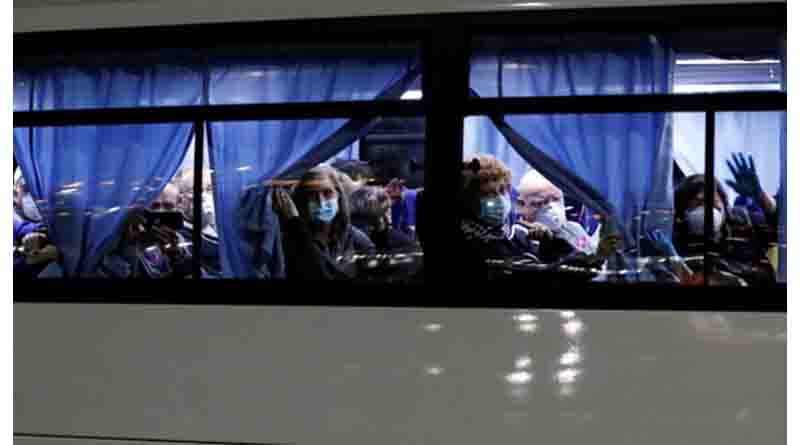Americans Leave Quarantined Japan Ship as Virus Cases Hit 355

Harumi Ozawa with Sara Hussein in Tokyo, Agence France-Presse
YOKOHAMA, Japan – Americans began leaving a quarantined cruise ship off Japan on Monday to board chartered flights home as the number of new coronavirus cases diagnosed on the vessel jumped to 355.
The evacuation came as Japanese authorities stepped up warnings over the deadly outbreak, urging citizens to avoid crowds and “non-essential gatherings.”
The Diamond Princess was placed in a 14-day quarantine in early February after a former passenger tested positive for the virus.
But US authorities announced Saturday they would offer Americans on board the option to leave the ship and fly home, where they will face another 14-day isolation period. Several other governments have announced plans to remove their citizens from the ship as well.
Late Sunday and into the early hours of Monday, Americans who opted to leave were brought off the ship in groups, passing through a makeshift passport control but undergoing no health checks, American passenger Sarah Arana told AFP.
They boarded buses driven by personnel in head-to-toe protective suits and were told that the more than a dozen vehicles would travel in a convoy.
“I am happy and ready to go,” Arana told AFP before leaving the ship. “We need a proper quarantine, this was not it.”
The US government should have intervened “much sooner, at the beginning,” the 52-year-old medical social worker said.
“This was too much for Japan, and they shouldn’t have had to bear the burden,” she added. “The people of Japan did not deserve this. I am full of gratitude.”
But other Americans on board declined the evacuation, despite being warned they will still have to wait two weeks and test negative for the virus before being allowed back to the United States.
“My health is fine. And my two-week quarantine is almost over. Why would I want to be put on a bus and a plane with other people they think may be infected when I have spent nearly two weeks isolated from those people?” tweeted Matt Smith, an American lawyer on the ship with his wife.
He described a fellow American passenger standing on her balcony chanting “USA, USA” as buses arrived to collect them.
“Of course, in contravention of the rules of quarantine, she’s not wearing a face mask, and she’s talking with a passenger on the adjacent balcony… And you wanted me to get on a bus with her?”
Earlier Sunday, health minister Katsunobu Kato said 1,219 people on the ship had now been tested for the virus, with 355 diagnosed with the illness.
Japan has not been able to test all those on board due to limited supplies of testing kits, facilities and manpower, which are also needed by authorities tracking the spread of the virus on land.
But the health ministry said Saturday that passengers older than 70 are being examined and those testing negative and in good health will be allowed to leave the ship from Wednesday.
Tests on younger passengers were expected to start Sunday and healthy people will be allowed to disembark after Wednesday, it said.
Other governments announced though that they too would seek to repatriate their nationals, with Hong Kong announcing plans to charter a flight for 330 city residents on the ship.
Canada announced a similar decision, while Australia and Taiwan are considering such a move, local media said.
In Japan, the number of new infections has continued to rise, with six new cases reported on Sunday, most of them in Tokyo. At least 59 cases have now been confirmed, including more than a dozen among the hundreds of Japanese nationals and their relatives repatriated from Wuhan, China, the epicentre of the outbreak.
A fifth evacuation flight left to China on Sunday night.
With the rise in local infections, Kato warned the country was “entering a new phase.”
“We are seeing infection cases that we are unable to trace back their transmission routes,” he told reporters.
“We want to ask the public to avoid non-urgent, non-essential gatherings. We want elderly and those with pre-existing conditions to avoid crowded places,” he added.
“I think it’s important that we exercise Japan’s collective strength.”
Source: https://news.abs-cbn.com



